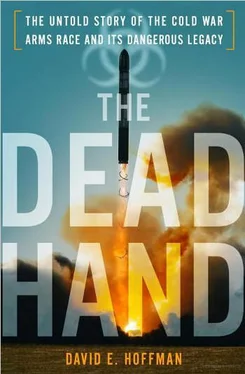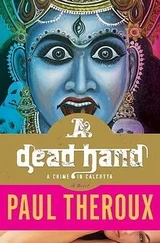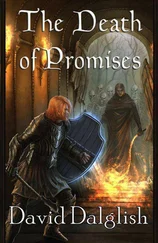After stepping into the mansion at Chequers, Gorbachev spoke to Thatcher over drinks in the Great Hall. He had risen to become Soviet agriculture chief, and inquired about farms he’d seen on the drive from London. The lunch table was set with Dover sole, roast beef and oranges, but they hardly touched the food. Gorbachev and Thatcher immediately fell into a vigorous debate. Gorbachev claimed the Soviet Union was reforming its economy. Thatcher, skeptical, lectured him about free enterprise and incentives. Gorbachev shot back that the Soviet system was superior to capitalism, and, according to Thatcher’s account, he declared that the Soviet people lived “joyfully.” Thatcher pointedly asked: then why are so many denied permission to leave? Gorbachev replied these people were working on national security matters. Thatcher didn’t believe it.
When they got up and left the dining room, Raisa went with Denis to look at the Chequers library, where she took down a copy of Hobbes’s Leviathan . Malcolm Rifkind, who accompanied her to the library, recalled she discussed her favorite contemporary British novelists, including Graham Greene, W. Somerset Maugham and C. P. Snow. 5
In the main sitting room, Thatcher and Gorbachev got down to business. Thatcher recalled that the content of Gorbachev’s remarks was unsurprising. What grabbed her attention was the refreshingly open style. “His personality could not have been more different from the wooden ventriloquism of the average Soviet apparatchik,” she said. “He smiled, laughed, used his hands for emphasis, modulated his voice, followed an argument through and was a sharp debater.” They talked for hours. Gorbachev did not consult prepared papers—he referred only to a small notebook of jottings, handwritten in green ink. “As the day wore on,” she added, “I came to understand that it was the style far more than the Marxist rhetoric which expressed the substance of the personality beneath. I found myself liking him.”
Gorbachev was well prepared. He quoted Lord Palmerston’s famous dictum that Britain had no permanent allies or enemies, only permanent interests. “This was remarkable most of all for the precisely effective way it was deployed—and by this ‘non-expert’ in foreign policy,” said Howe, who attended. He quoted Gorbachev as adding, “It is up to us to identify the interests we have in common.” 6Thatcher steered Gorbachev toward the topic of the arms race. After a year of impasse, the negotiations were to reopen in Geneva in three weeks, the first since the Soviets had walked out during the 1983 war scare.
At this moment, Gorbachev reached into his suit pocket. He unfolded a diagram he had brought with him, the size of a newspaper page. The page was filled with 165 boxes containing five thousand small dots, except for the center box, which had only one. The single dot in the center represented the explosive power of 3 million tons of bombs dropped by the Allies during the six years of World War II. The other dots represented the 15 billion tons of explosive power in the American and Soviet nuclear arsenals.
Gorbachev’s diagram, which had been published in the New York Times as an advertisement by antinuclear businessmen the previous February, might have been dismissed as a piece of agitprop, a gimmick. 7What was significant was not so much the dots and squares on the page, but the obvious enthusiasm of the man who was using it to make his point. Gorbachev was knowledgeable, unhesitating and demonstrative.
In Moscow, Gorbachev at this point had participated in the high-level internal discussions of military and foreign policy issues, such as the war in Afghanistan, the deployment of the Pioneer missiles, the shooting down of KAL 007 and the strategic arms negotiations. But little was known outside the Soviet Union of his views. He had never spoken out so openly on disarmament and foreign affairs as he began to do in Britain. Throughout the visit, he called attention to the dangers of nuclear war and emphasized Soviet fears of an arms race in space. He promised “radical reductions” in nuclear weapons and signaled that the Soviets were serious about returning to the Geneva talks. He confidently parried criticism about human rights and Afghanistan. In substance, Gorbachev did not change Soviet policy, and in the meeting with Thatcher, he went out of his way to cite Chernenko as the source of his authority. 8But his style spoke volumes. He seemed to promise a more flexible approach, a sharp contrast with the rigidity of the past.
Gorbachev felt the conversation with Thatcher was a personal turning point. 9He recalled vividly the diagram he presented at Chequers. He said he told Thatcher that all the weapons in one box on that page would “suffice to blow up the foundation of life on Earth. And it turns out that it can be done another 999 times—and what’s after that? What, blow it up one million times? That is absurd. We were possessed by the absurd.”
“It had been accumulated already, stored already—including inside of me—that something needed to be done,” he said of the threat of nuclear war. “To describe it in one word, or one sentence: that something needs to be done.” But Gorbachev acknowledged it was difficult for him, back then, to imagine what that would be. Even as he unfolded the paper with all the squares and dots in front of Thatcher, he had no idea how to reduce the nuclear arsenals. He wondered, “How could all of it be stopped?”
Thatcher wasn’t impressed with the Gorbachev diagram, but remembered he carried off the presentation with “a touch of theatre.” Gorbachev also warned of the dangers of a “nuclear winter” that would follow a war with atomic bombs. 10But Thatcher said, “I was not much moved by all this.” She responded with a heartfelt lecture on the virtues of nuclear deterrence: the weapons, she said, had kept the peace. This was one of her core beliefs. Thatcher was “eloquent and emotional,” Gorbachev remembered.
Thatcher also knew Gorbachev might give her a message for Reagan. She listened closely when he spoke about Reagan’s Strategic Defense Initiative. Privately, Thatcher had little confidence in Reagan’s dream of making nuclear weapons obsolete, but kept her counsel. What caught her ear at Chequers was the urgency in Gorbachev’s voice. The Soviets, she concluded, “wanted it stopped at almost any price.” She told Gorbachev there was no way Britain would be split from the United States. Gorbachev was supposed to leave at 4:30 P.M., but remained until 5:50 P.M. As his car pulled away, Thatcher recalled, “I hoped that I had been talking to the next Soviet leader.”
Officially, Gorbachev came to London as head of a Supreme Soviet delegation, but his reception and performance were anything but low-key. He charmed his hosts and captured the imagination of Britain. Television had never looked kindly on any Soviet leader, but Gorbachev thrived on the attention. “Red Star is born,” the Daily Mail said of Raisa. The Gorbachevs stopped in the cavernous reading room of the British Museum to see the place where Karl Marx had written Das Kapital , and they toured Westminster Abbey, seeing the graves of medieval kings, memorials to national poets, taking interest in the stained glass windows and the architecture.
On Monday, Thatcher gave an interview to the BBC. In her first answer to a question, she declared:
“I like Mr. Gorbachev. We can do business together.” 11
Gorbachev’s visit was interrupted by news of the sudden death in Moscow of Dmitri Ustinov, the defense minister. Gorbachev flew home. Without Ustinov, there would be a new leadership vacuum. Chernenko was so ill he could not attend Ustinov’s funeral, and Gorbachev faced still more uncertainty in the Kremlin. “The leadership of the country was in a deplorable state,” he said.
Читать дальше












